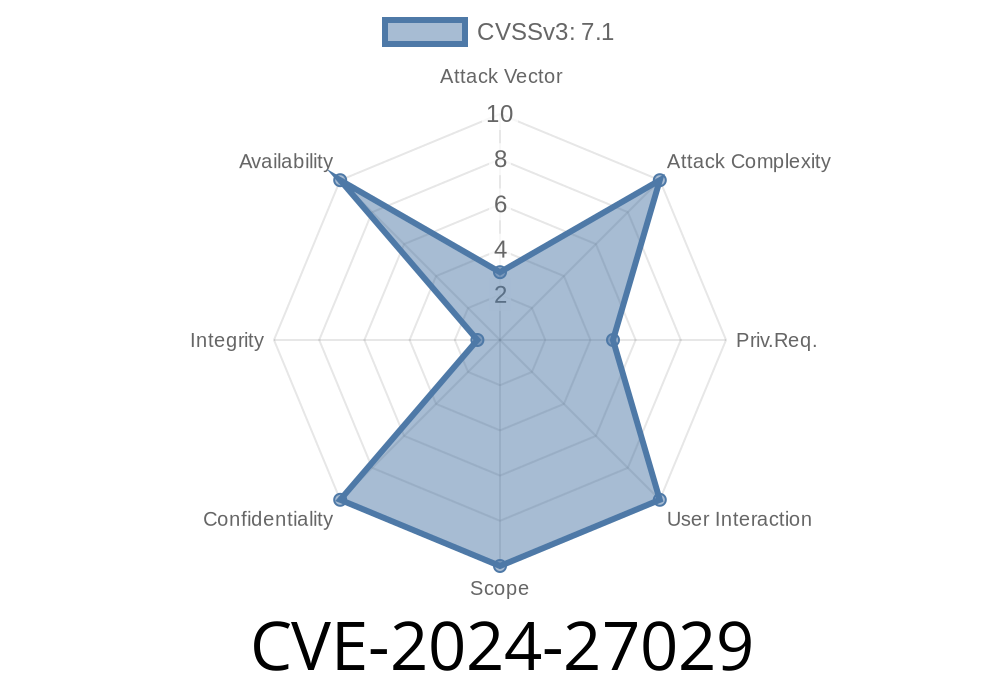The Linux kernel is critical to powering many of today's systems, from servers to desktops. Graphics drivers are a complex part of this ecosystem, and security vulnerabilities in them can have serious implications. Recently, the kernel team fixed a flaw in the AMDGPU (AMDGPU Direct Rendering Manager) driver that affected how it handled MMHUB client IDs—a bug now tracked as CVE-2024-27029.
Let’s break down what this means and how it was fixed, using a straightforward approach for easy understanding.
What is CVE-2024-27029?
CVE-2024-27029 is a vulnerability in the Linux kernel’s AMDGPU driver, specifically in how it processes MMHUB client IDs (cid). The bug involved an out-of-bounds access, which happens when software tries to read or write outside the limits of a data structure—often leading to crashes or, in the worst case, giving attackers a chance to exploit the system.
The Root Cause
The problem was with certain client IDs, including cid x140, which were not correctly handled. This could result in the driver accessing invalid memory—something that must always be avoided in kernel code.
The driver did not check if the cid was within valid bounds.
- A request with, for instance, cid x140 could cause the driver to overstep allocated arrays—triggering a bug.
The Vulnerable Code (Before the Fix)
Let's take a look at a simplified snippet of the code prior to the patch. This will help clarify where things went wrong:
// Hypothetical example for illustration
static void handle_mmhub_request(int cid) {
static const char* client_names[] = {
/* ... a list of valid client names ... */
};
// Vulnerable: No bounds check for client id
printf("Client: %s\n", client_names[cid]);
}
If cid is larger than the number of entries in client_names[], this will access memory it shouldn’t.
The Patch: How Was CVE-2024-27029 Fixed?
The maintainers addressed the error by adding proper validation for the client ID. Specifically, they made sure that when a cid like x140 is encountered, it’s either handled safely or ignored.
Here’s a simplified version of the patched logic
static void handle_mmhub_request(int cid) {
static const char* client_names[] = {
/* ... list of valid client names ... */
};
size_t num_clients = sizeof(client_names) / sizeof(client_names[]);
if (cid < || cid >= num_clients) {
printf("Unknown client id: %x\n", cid);
return;
}
printf("Client: %s\n", client_names[cid]);
}
With this, any client ID outside the bounds won’t cause trouble; it’s recognized as invalid, and the driver fails gracefully.
How Can Attackers Exploit This?
If left unpatched, carefully crafted inputs or malicious userspace programs could cause the kernel driver to access invalid memory:
This could crash the GPU or the entire system (DoS—Denial of Service).
- In rare cases, an attacker might use the out-of-bounds access to gain greater control over the system.
Who Is Affected?
- Systems running Linux with AMDGPU kernel drivers, especially if using graphics cards with MMHUB support (most recent AMD GPUs).
- Kernel versions before the patch. The fix is included in recent kernel releases; see the references below.
Recommendation: If you manage Linux systems using AMD graphics, update your kernel as soon as possible.
References & Further Reading
- Patch Commit in Linux Kernel GitHub
- NVD Entry for CVE-2024-27029
- Kernel.org Stable Release Notes (search for “amdgpu mmhub”)
- AMDGPU Driver Documentation
Conclusion
CVE-2024-27029 highlights how minor oversights in bounds checking—even in something as low-level as a GPU driver—can open the door to critical bugs. The Linux community responded quickly, with a patch now available. Stay safe: keep your kernels up to date and always be vigilant for new advisories, especially if running GPU-intensive workloads.
If you’re a developer or sysadmin, remember: Always validate your inputs, especially when working in the kernel!
Did you find this useful? Share your feedback or questions below—let’s keep our systems secure, together.
Timeline
Published on: 05/01/2024 13:15:49 UTC
Last modified on: 12/23/2024 19:33:28 UTC
